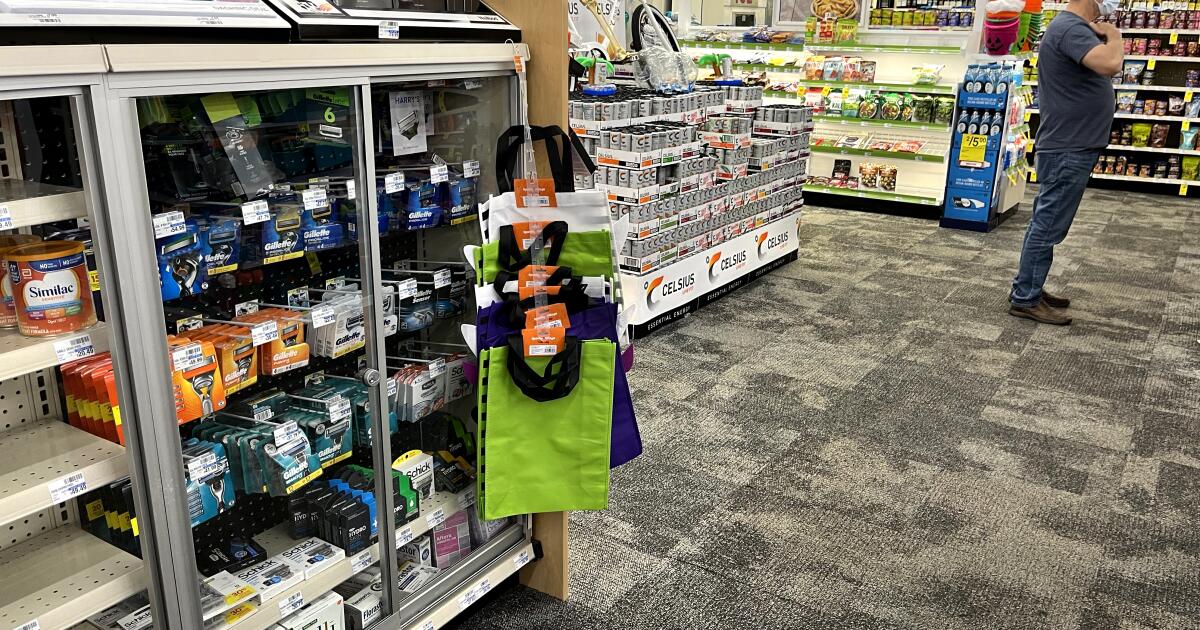
A majority of likely California voters favor tougher penalties for crimes involving theft and fentanyl, according to a new poll from the University of California, Berkeley’s Institute for Governmental Studies, co-sponsored by the Times.
Poll results released Friday showed that 56 percent of Californians would support Proposition 36, an initiative to be voted on in November that would impose tougher penalties for repeat thefts and crimes involving the deadly drug fentanyl.
The proposal has been at the center of a battle at the state Capitol this year, as Republicans and law enforcement advocates call for reversing Democratic reform policies that downgraded some felonies to misdemeanors, which they blame for an increase organized retail theft And burglaries.
The poll also gauges how voters feel about initiatives designed to address high demand in California. cost of living. According to the poll, a majority of likely voters support a measure to raise the state minimum wage to $18 an hour, though respondents are more divided on a measure that would encourage local governments to expand rent controls, but still lean toward a “yes” vote.
The broad support for Proposition 36, the tough-on-crime measure, comes as Gov. Gavin Newsom and state Democrats try to balance frustrations over crime among Californians with the criminal justice reform goals that voters once supported.
The initiative aims to renovate parts of Proposition 47a measure approved by voters a decade ago that lowered some felony penalties in an effort to reduce the state’s prison population and give nonviolent offenders a better chance at rehabilitation and freedom.
Mark DiCamillo, director of the Berkeley IGS Poll, a nonpartisan survey of California public opinion, pointed to the “high visibility” of retail thefts — either caught on camera or witnessed by voters in their communities — as a possible reason why more than twice as many voters said they support Proposition 36 as those who do not.
“It’s pretty outrageous to voters, what they see, and they associate it with the approval of Proposition 47,” DiCamillo said.
Becky Warren, a spokeswoman for the “Yes on Proposition 36” campaign, said the poll “confirms that Californians want real solutions to our homelessness and drug crises” and that the measure will ensure “repeat offenders are held accountable and face consequences.”
While supporters of the GOP-backed measure — which has garnered support from some Democrats, including San Francisco Mayor London Breed — see it as a solution to some crimes, but opponents say it will lead to a costly increase in the state’s prison population.
Newsom and Democrats have tried to shape a rival referendum measure this summer, which would have addressed crimes like shoplifting with a less punitive approach than Proposition 36, promoted by the district attorney. That measure, however, was abruptly abandoned by the governor last month amid chaotic negotiations at the Capitol.
Anthony York, a former Newsom spokesman who is now a spokesman for the No on Proposition 36 campaign, said he is confident that as Election Day approaches and voters better understand the nuances of the initiative, they will change their minds.
“This is really about restarting the war on drugs, recriminalizing drug possession and wasting billions of dollars on prisons and detention centers with no way to fund them,” York said. “Quality of life issues are important, and that’s understandable. People want and deserve to feel safe in their own communities. But they also don’t want bad policies that are going to ruin lives and set us back.”
Likely voters also support Proposition 32 Americans have voted in favor of raising the minimum wage from $16 an hour to $18. According to the poll, 52% of Americans intend to vote “yes” and 34% intend to vote “no.” The rest of the voters surveyed are undecided.
The measure is supported by Joe Sanberg, a wealthy Los Angeles investor and anti-poverty activist, and comes as unions have won raises for individual industries, ensuring $25 per hour for healthcare professionals and $20 per hour for fast food workers.
Several cities, including West Hollywood and Berkeley, have surpassed the legal minimum and already pay more than $18 an hour. Supporters of the measure say wages should be more uniform across the state, while business groups oppose it for fear of collapsing already struggling companies.
On Proposition 33, A measure that could expand rent control, 40% of likely voters said they would support the initiative, while 34% oppose it. The measure would give local jurisdictions in California more power to regulate rents and repeal a law that prohibits localities from capping prices on certain properties.
The measure is sponsored by the AIDS Healthcare Foundation, a Los Angeles nonprofit that has supported similar rent control initiatives in the past, and is opposed by the real estate industry, which warns it could incentivize developers to build less — a problem that could worsen California’s housing crisis.
Ten measures In total, 100 candidates will be running in November. DiCamillo said that with a high-stakes presidential election, political enthusiasm could spread and draw record attention to proposals that could significantly change California politics.
“I expect a strong turnout, and that’s usually beneficial for issues lower on the ballot,” he said.
Times reporters Anabel Sosa and Andrew Khouri contributed to this report.

